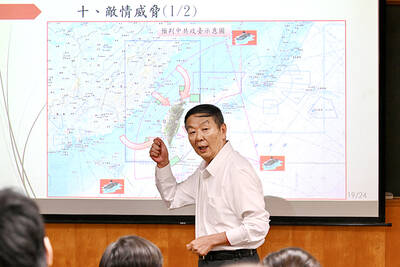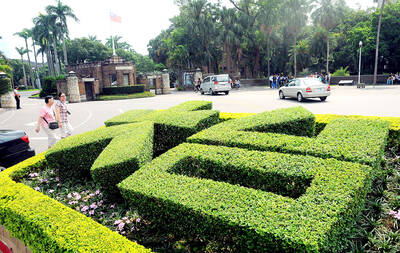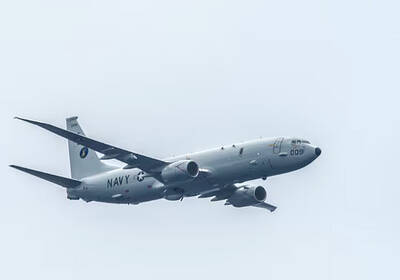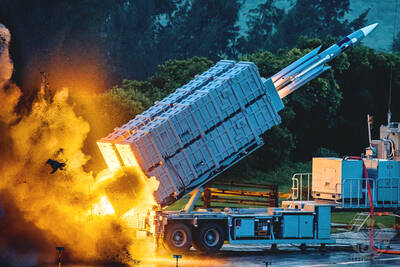The US has an “unwavering” commitment to the Philippines, US Vice President Kamala Harris yesterday told Philippine President Ferdinand Marcos Jr during a visit aimed at countering China and rebuilding ties that were fractured over human rights abuses in the Southeast Asian nation.
Harris is the highest-ranking US official to visit Manila since Marcos took power in June, signaling a growing rapport between the longtime allies after years of frosty relations under his Beijing-friendly predecessor, former Philippine president Rodrigo Duterte.
She also met with Philippine Vice President Sara Duterte, the daughter of the former leader whose deadly drug war sparked an international investigation into alleged human rights abuses.
“We stand with you in defense of international rules and norms as it relates to the South China Sea,” Harris told Marcos at the start of talks in the presidential palace in Manila.
“An attack on the Philippine armed forces, public vessels or aircraft in the South China Sea would invoke the US mutual defense commitment... That is our unwavering commitment to the Philippines,” Harris said.
Marcos said he did not “see a future for the Philippines that does not include the United States.”
Washington is seeking to bolster its security alliance with Manila under the new president.
That includes a mutual defense treaty and the 2014 Enhanced Defense Cooperation Agreement (EDCA), which allows for the US military to store defense equipment and supplies on five Philippine bases.
It also allows US troops to rotate through those military bases.
EDCA stalled under Rodrigo Duterte, but the US and the Philippines have expressed support for accelerating its implementation as China becomes increasingly assertive.

RETHINK? The defense ministry and Navy Command Headquarters could take over the indigenous submarine project and change its production timeline, a source said Admiral Huang Shu-kuang’s (黃曙光) resignation as head of the Indigenous Submarine Program and as a member of the National Security Council could affect the production of submarines, a source said yesterday. Huang in a statement last night said he had decided to resign due to national security concerns while expressing the hope that it would put a stop to political wrangling that only undermines the advancement of the nation’s defense capabilities. Taiwan People’s Party Legislator Vivian Huang (黃珊珊) yesterday said that the admiral, her older brother, felt it was time for him to step down and that he had completed what he

Taiwan has experienced its most significant improvement in the QS World University Rankings by Subject, data provided on Sunday by international higher education analyst Quacquarelli Symonds (QS) showed. Compared with last year’s edition of the rankings, which measure academic excellence and influence, Taiwanese universities made great improvements in the H Index metric, which evaluates research productivity and its impact, with a notable 30 percent increase overall, QS said. Taiwanese universities also made notable progress in the Citations per Paper metric, which measures the impact of research, achieving a 13 percent increase. Taiwanese universities gained 10 percent in Academic Reputation, but declined 18 percent

CHINA REACTS: The patrol and reconnaissance plane ‘transited the Taiwan Strait in international airspace,’ the 7th Fleet said, while Taipei said it saw nothing unusual The US 7th Fleet yesterday said that a US Navy P-8A Poseidon flew through the Taiwan Strait, a day after US and Chinese defense heads held their first talks since November 2022 in an effort to reduce regional tensions. The patrol and reconnaissance plane “transited the Taiwan Strait in international airspace,” the 7th Fleet said in a news release. “By operating within the Taiwan Strait in accordance with international law, the United States upholds the navigational rights and freedoms of all nations.” In a separate statement, the Ministry of National Defense said that it monitored nearby waters and airspace as the aircraft

UNDER DISCUSSION: The combatant command would integrate fast attack boat and anti-ship missile groups to defend waters closest to the coastline, a source said The military could establish a new combatant command as early as 2026, which would be tasked with defending Taiwan’s territorial waters 24 nautical miles (44.4km) from the nation’s coastline, a source familiar with the matter said yesterday. The new command, which would fall under the Naval Command Headquarters, would be led by a vice admiral and integrate existing fast attack boat and anti-ship missile groups, along with the Naval Maritime Surveillance and Reconnaissance Command, said the source, who asked to remain anonymous. It could be launched by 2026, but details are being discussed and no final timetable has been announced, the source